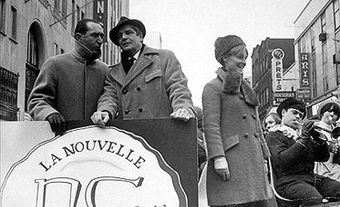Founded in 1955, the Théâtre de Quat'Sous is one of Montréal's oldest theatre companies after the Théâtre du Rideau Vert and the Théâtre du Nouveau Monde. The smallest of the grand theatres, with 170 seats, has been home to several decisive moments of creativity and daring in Quebec's cultural landscape, making it an almost mythic place. The old building housing the theatre was demolished in 2008, to give way to a new one, inaugurated in 2009.
Origins
In 1955, Paul Buissonneau, who wanted to present a show at Montreal’s Festival d’art dramatique, founded the Théâtre de Quat'Sous. Orion le tueur, presented at the Gesù during the festival, was the first production. A dozen others followed, including La Tour Eiffel qui tue, Les Oiseaux de lune, La Bande à Bonnot and Le Manteau de Galilée, a play Buissonneau wrote.
After the purchase and transformation of a synagogue on Avenue des Pins, the artistic director and his collaborators, Yvon Deschamps, Claude Léveillée and Jean-Louis Millette, inaugurated their theatre on December 3, 1965, with La Florentine by Jean Canolle.
Actor and director Paul Buissonneau remained at the helm of the Quat'Sous, until May 1984. Several noteworthy creations took shape under his direction, starting with L'Osstidcho, a legendary stage and musical happening presented in 1968. This show made Robert Charlebois, Yvon Deschamps, Louise Forestier, Mouffe and the Quatuor du Jazz libre du Québec known to the public. Two Michel Tremblay plays were created there: En pièces détachées in 1969 and Hosanna in 1973, directed by André Brassard. In 1970, one of the first collective creations was presented there: T'es pas tannée, Jeanne D'Arc? of the Grand Cirque Ordinaire. In 1978, the Quat'Sous Bar was set up in the theatre lobby, where small shows, conferences and readings were held.
Directors Louise Latraverse and Louison Danis
In the fall of 1984, the Quat'Sous founder passed the baton to actor Louise Latraverse. She continued to feature young creative people. That year, the Montreal public discovered the Théâtre Repère de Québec, in which Robert Lepage is a major figure, with Circulations.
Two years later, Lepage presented his solo act Vinci there. In 1985, the creation of Being at Home with Claude by René-Daniel Dubois introduced the actor Lothaire Bluteau, who then went on to a career in film. That same year, the theatre was renovated: columns were removed and new technical equipment and seats were added. Louison Danis then assumed artistic direction for two years before turning it over to Pierre Bernard.
Director Pierre Bernard
In 1988, the creation in Quebec City of Elvire Jouvet 40 by Brigitte Jaques, featuring Sylvie Drapeau and Luc Picard, under Françoise Faucher's direction, marked the arrival of Pierre Bernard as the new director of Théâtre de Quat'Sous. Faucher promoted daring of all kinds, and several impressive works followed: Le Polygraphe by Lepage; La Charge de l'orignal épormyable by Claude Gauvreau; Unidentified Human Remains and the True Nature of Love by Brad Fraser; Brilliant Traces by Cindy Lou Johnson; All in the Timing by David Ives; Sex, Drugs, Rock & Roll by Eric Bogosian; Decadence by Steven Berkoff; Trainspotting by Irvine Welsh; The Abdication by Ruth Wolff; and the Suburban Motel cycle by George F. Walker. The Quat’Sous stage thus was opened to contemporary English-language drama translated into French.
In 1999, Serge Denoncourt directed a memorable Je suis une mouette (non, ce n'est pas ça) based on Anton Tchékhov.
On September 7, 1998, a fire in the theatre's administration offices destroyed written and audiovisual archives.
Direction of Wajdi Mouawad
In 2000, author, director and actor Wajdi Mouawad became the artistic director of Théâtre de Quat'Sous. Among the important shows under his leadership were his own Rêves and Incendies, Novecento by Alessandro Baricco, directed by François Girard, Blasted by Sarah Kane, Impératif présent by Michel Tremblay and The Bell Jar by Sylvia Plath, directed by Brigitte Haentjens.
Director Eric Jean
In August 2004, Eric Jean assumed direction of Théâtre de Quat'Sous, and there he has hosted unparalleled theatre adventures: El Cartero de Neruda (Ardiente Paciencia) [The Postman/Il Postino] by Antonio Skarmeta, Wit by Margaret Edson, directed by Denise Guilbault, La Hache by Larry Tremblay and Chasseurs, which he directed.
The relaunch of Théâtre de Quat’Sous in its new building doubtless highlighted Eric Jean’s transition to artistic director in 2009.
Since 2016, Olivier Kemeid has assumed direction of the Théâtre de Quat'Sous.


 Share on Facebook
Share on Facebook Share on X
Share on X Share by Email
Share by Email Share on Google Classroom
Share on Google Classroom

